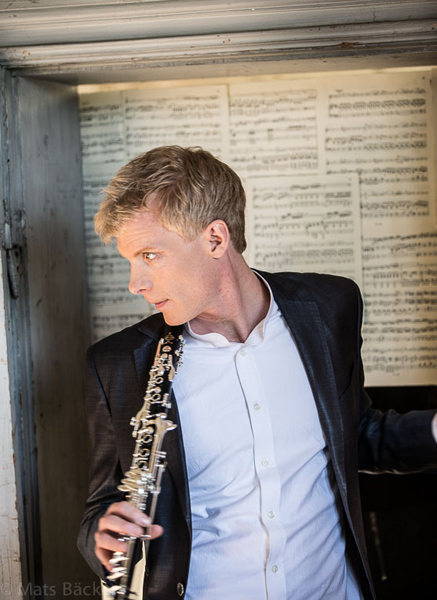Copland, Eastman works provide the highlights to close “Clarinet Visions”

[Editor’s Note: Technical issues prevented this review from being posted last weekend.]
The second and final night of the New World Symphony’s “Clarinet Visions” festival encompassed a seven-decade sampling of American music for the instrument. While the quality of the works presented at the New World Center in Miami Beach on Saturday night varied widely, the program was consistently stimulating. A great performance of one of the classic 20th century clarinet concertos shared the bill with scores that ranged stylistically from minimalism to jazz and rock.
Honk if You Love Me by Nina Shekhar might be described as a “theater work” or, in years past, “a happening.” Conceived for clarinet, tabla, electronics and dancer, Shekhar’s work takes its concept from the constant honking horns of traffic in her native India. As Shekhar explained prior to the performance, honking horns in India are a way of greeting friends and acquaintances.
The clarinet intones brief, fragmentary figures with tabla drums providing a rhythmic backdrop. A touch of modern jazz ensues before the electronic component provides a counterpoint of horns and crowd noises The dancer attempts to duplicate the music’s shifts and acerbic motifs.
Andrea Levine, principal clarinet of the Louisville Orchestra and a former New World fellow, displayed agility in huge leaps between registers and flexibility with the electronic cacophony of sounds that match and sometimes run counter to the clarinet’s motifs. Rajesh Bhandari was the masterful tabla player, keeping the pulse of the eleven-minute work moving. With the stage floor lit in green patterns and additional designs on the hall’s screens by Clyde Scott, Jigna Sha combined traditional Indian and modern dance movements in the visual component. The work’s purely musical value is more questionable.
Anthony Davis’s You Have the Right to Remain Silent, a concerto for clarinet, Kurzweil synthesizer and ensemble, takes its title from the Miranda warning given by police when arresting or interrogating individuals suspected of committing a crime.
The four-movement, 26-minute work (originally written in 2006 and revised in 2011) tends toward tedium and heavy handedness but has some arresting moments along the way. A blues-infused secondary subject by the clarinet over harp glissandos in the opening movement “Interrogation” catches the ear. In the second movement “Loss,” the soloist switches to contra-alto clarinet, a huge instrument with a deep sonority below that of the contrabass clarinet, buttressed by eerie sounds from the synthesizer. For a brief instant, the orchestra becomes a swinging big band. Indeed, the score’s best moments recall Davis’ early career as a jazz pianist and ensemble leader and channel energy and pulsation otherwise lacking in the opus.
Anthony McGill, the New York Philharmonic’s principal clarinet, brought tremendous flair and agile technique to the work’s formidable demands. He played the contra alto instrument with nimble articulation. Kazem Abdullah conducted vigorously and brought a measure of coherence to Davis’ diffuse writing.
The program’s second half held the evening’s most compelling works. The music of Julius Eastman (1940-1990) has been rediscovered and performed in recent years. An early proponent of minimalism, Eastman’s life was cut short by drug addiction and homelessness.
Joy Boy for four clarinets dates from 1974 when he was teaching at the State University of New York in Buffalo on a faculty that also included Morton Feldman and John Cage. In this work, Eastman left the exact rhythm and number of repetitions to the performers. The repetitive figuration proved hypnotic and the four players made good choices in slightly slowing the pace, then moving forward. Levine, Laura Ardan and the New World Symphony’s Julianna Darby and Angelo Quail gave a well- coordinated, eight-minute reading with a varied dynamic palette and sensitive instrumental shading.
Aaron Copland’s 1948 Clarinet Concerto is an American classic. Commissioned by Benny Goodman, the work’s orchestral scoring comprises strings, harp and piano. The performance of Swedish virtuoso Martin Fröst could scarcely be bettered. In the opening movement, Fröst phrased Copland’s pastoral lyricism in long, unhurried lines. He tossed off the jazzy pyrotechnics of the cadenza, which connects the score’s two movements, with the fluency of a veteran jazzman. In the finale, Fröst took the clipped figures at top speed and really cut loose in the coda, playing at high velocity. A master of the instrument, Fröst’s technique was stellar, his tone mellow. Abdullah drew brilliant and precise playing from the string ensemble and displayed real affinity for Copland’s distinctive Americana idiom.
The final chord brought the audience to its feet and the cheering did not subside until Fröst offered a typically quirky encore – his brother Göran Fröst’s arrangement of the traditional Klezmer dance “Be Happy.” Prancing about the stage, Fröst played with the abandon of a village band member, with thrilling wails and trills.
The evening concluded with the rock beat of “Jam on toast,” the third movement from Derek Bermel’s Voices for clarinet and orchestra. With full brass and percussion sections and two electric guitars plus a whistle, Chad Goodman brought the orchestral forces to a high volume. New World fellow Jesse McCandless’s clarinet squealed and chirped in frenzied patterns, bringing the celebration of the instrument to a roof-raising climax.
Roderick Cox conducts the New World Symphony in Esa-Pekka Salonen’s Helix, Tchaikovsky’s Symphony No. 4 and Victor Herbert’s Cello Concerto No. 2 with soloist Zuill Bailey. 8 p.m. March 26 and 2 p.m. March 27 at the New World Center in Miami Beach. nws.edu
Posted in Performances
Leave a Comment
Tue Feb 22, 2022
at 9:14 am
No Comments




